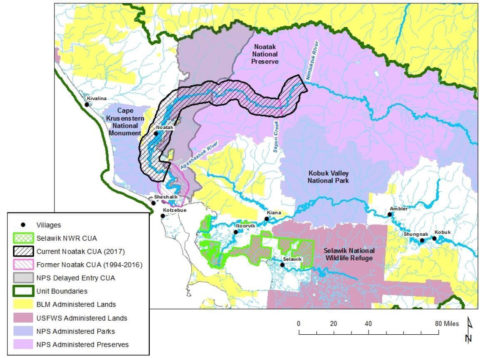
Safari Club International On Subsistence Caribou Hunting Issues
In early March, the Alaska Board of Game recommended that subsistence caribou hunters in Western Alaska and voted that proposal through late last week. Here’s what the board originally said:
In February 2021, the Northwest Arctic Subsistence Regional Advisory Council submitted a Wildlife Special Action Request WSA21-01 to close Federal public lands in Units 23 and 26A to the harvest of caribou and moose by non-Federally qualified users from August 1 through September 30, 2021. In June 2021, the Federal Subsistence Board (Board) deferred this request to 2022, instructing the Office of Subsistence Management (OSM) to seek additional input on concerns related to caribou. The Board also asked OSM to include comparisons of moose harvest by survey area within Unit 23 in their analysis.
A telephonic work session is scheduled for March 30, 2022, beginning at 1p.m. The purpose of this work session is for the Board to further discuss and take action on WSA21-01. The revised analysis will be available at least one week before the teleconference, at https://www.doi.gov/subsistence/board.
Safari Club International reacted to the vote with a plea to protect all hunters in Alaska and beyond:
On March 30th, the Federal Subsistence Board (FSB) took action on a temporary Wildlife Special Action (WSA21-01) that proposed to close the moose and caribou hunting season to anyone except qualified subsistence hunters from August 1st to September 30th, 2022, on two specific federal land units in Alaska.
Although they did not vote to close the entire proposed area of units 23 and 26A, they modified the closure to include the Noatak National Preserve and BLM managed lands between the Noatak and Kobuk rivers in Unit 23 to caribou hunting. For moose, they closed federal public lands in GMU 23.
SCI’s intervention in June and November of 2021 delayed these actions but now unelected bureaucrats are usurping the Alaska Department of Fish and Game’s power to oversee sustainable wildlife management within its own state borders.
Hunters and anglers provide an essential role in funding and maintaining these public wildlife preserves across the United States. That is why SCI has constantly sought a No-Net-Loss commitment from the Biden Administration for hunting and fishing access.

Today’s FSB decision, however, jeopardizes access on millions of acres of federal land, which is equivalent to the total land area of Maryland, Massachusetts, Vermont, New Hampshire, New Jersey, Connecticut, Delaware, and Rhode Island COMBINED.
This high-handed decision will result in thousands of Alaska residents and non-resident hunters losing access to hunting moose and caribou. This proposal fails to fulfill the principal requirement to demonstrate the “significant change in resources” threshold to cut off hunting access to thriving moose and caribou herds in these massive tracts of land.
In an April 2021 letter, the Alaska Department of Fish and Game stated their adamant opposition to “this special action request as the rationale given does not meet the requirements for such a closure … for either the conservation of healthy populations of moose and caribou or for the continuation of subsistence uses of such populations.”
Stand with SCI and Alaskan wildlife officials’ prerogative to regulate hunting and fishing policies within state borders by signing our No-Net-Loss petition, which urges the Biden Administration to commit to protect existing hunting and fishing access on federal lands across the United States.



